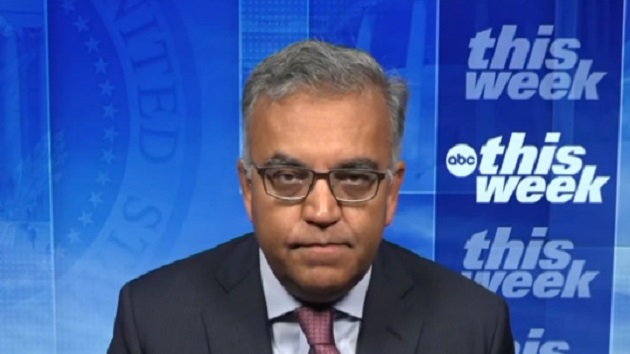
(NEW YORK) — The Biden administration is planning for a likely wave of COVID-19 infections this fall and winter by ensuring both a “new generation” of vaccines and access to treatment and testing, White House COVID-19 Response Coordinator Dr. Ashish Jha said on Sunday — but he stressed that plan depended on congressional funding.
“We have the resources,” Jha told ABC “This Week” co-anchor Martha Raddatz. “One of the reasons I’ve been talking a lot about the need for Congress to step up and fund this effort is if they don’t, Martha, we will go into the fall and winter without that next generation of vaccines, without treatments and diagnostics. That’s going to make it much, much harder for us to take care of and protect Americans.”
Jha has been urging lawmakers to approve President Joe Biden’s request for an additional $22.5 billion in COVID funding, warning that the nation has spent much of the money dedicated to pandemic testing and treatments, including what was in the $1.9-trillion American Rescue Plan signed into law last year. That request, however, remains stalled in Congress amid GOP opposition.
Meanwhile the U.S. is experiencing another COVID wave, with cases rising in nearly every state. Official infection numbers are up to more than 100,000 per day and COVID-related seven-day average hospitalizations rose by around 24% from the prior week, according to the latest CDC data. Experts say this surge is due in part to the virus’ continued variants and subvariants, some of which are increasingly contagious. Vaccination, the White House says, remains a key strategy at preventing severe illness death and lessening the spread.
“What we know is that this virus is evolving very quickly and every iteration of it has more and more immune escape [which] makes it harder for this virus to be contained unless we continue vaccinating people and keeping people up-to-date,” Jha said on “This Week.”
With the recent spikes in COVID cases and hospitalization numbers, Jha said vaccination or boosters were crucial and that he felt “very strongly” Americans should wear masks indoors again.
“When you’re in an indoor space, you should be wearing a mask,” he said. “First and foremost, my advice is if you have not gotten vaccinated in the last five months, if you have not gotten boosted, you need to go out to do that now.”
Raddatz pressed Jha on whether the administration had considered a new public health strategy considering their consistent advice had not broken through to all quarters of the public.
But, Raddatz asked, had the administration been considering another public health strategy considering their consistent advice (vaccines, masking) had not broken through to all quarters of the public?
“You said month after month after month, put your masks on, get a vaccine, get a booster, but the numbers aren’t really moving. So what kind of discussions do you have about another plan?” Raddatz said.
“We want to help people understand that we are in a different moment than we were two years ago, right? We are at a point where lots of people are vaccinated and boosted, where we do have widespread therapies available,” Jha said.
“And so the key discussion now is: How do we help Americans through this moment? And, this is really important, Martha, how do we prepare for future variants, how do we prepare for the evolution of this virus, and how do we make sure we have the resources to do it so we can protect Americans as this virus continues to evolve?”
With the Centers for Disease Control and Prevention this week backing booster eligibility for children 5 to 11 at least five months after their initial shots, Raddatz pressed Jha on when kids not yet eligible may be able to get their first shots.
“But what about 5 and under? How soon might we see that?” Raddatz asked.
“What I know is that Moderna has completed its application, those data are being looked at very closely right now by FDA [Food and Drug Administration] experts. And my expectation is that as soon as that analysis is done, probably within the next few weeks, we’re going to get that expert outside committee,” Jha said, referring to an FDA advisory committee. “And then after that, FDA’s going to make a decision.”
“My hope is that it’s going to be coming in the next few weeks,” he said.
Jha also talked about another infection that has gained increasing attention: monkeypox. Biden recently said it was “something that everybody should be concerned about.”
Jha, however, cautioned that there were significant differences between the COVID pandemic and the latest monkeypox cases, which have two confirmed infections so far in the U.S.– in Massachusetts and New York.
The U.S. is equipped with vaccines against it, Jha noted. And monkeypox has long been studied around the world.
“I would not be surprised, Martha, if we see a few more cases in the upcoming days. And I think the president’s right: Anytime we have an infectious disease outbreak like this we should all be paying attention,” he said. “But I feel like this is a virus we understand. We have vaccines against it, we have treatments against it, and it spreads very differently than SARS-CoV-2. It’s not as contagious as COVID.”
Copyright © 2022, ABC Audio. All rights reserved.
